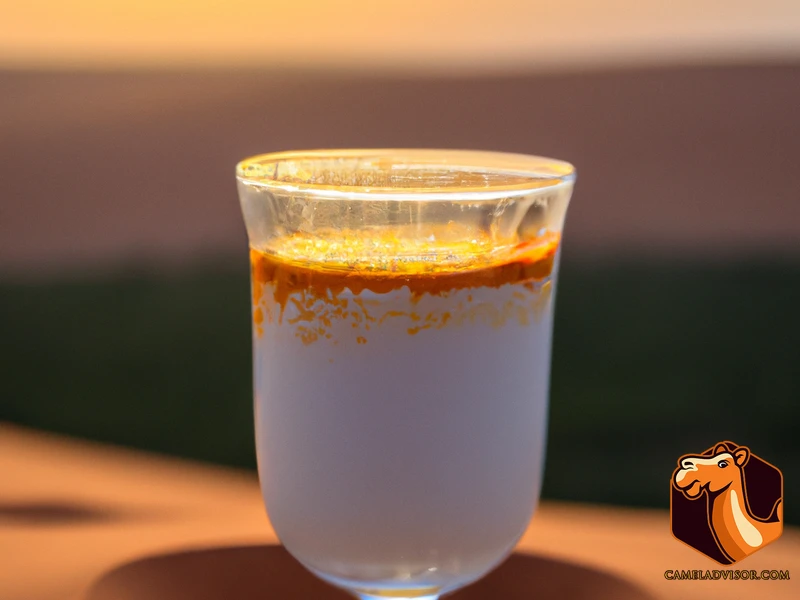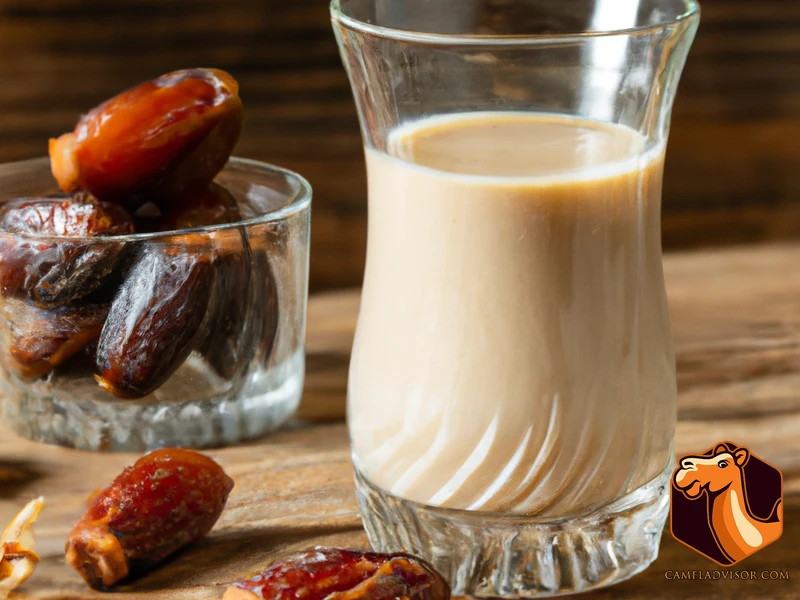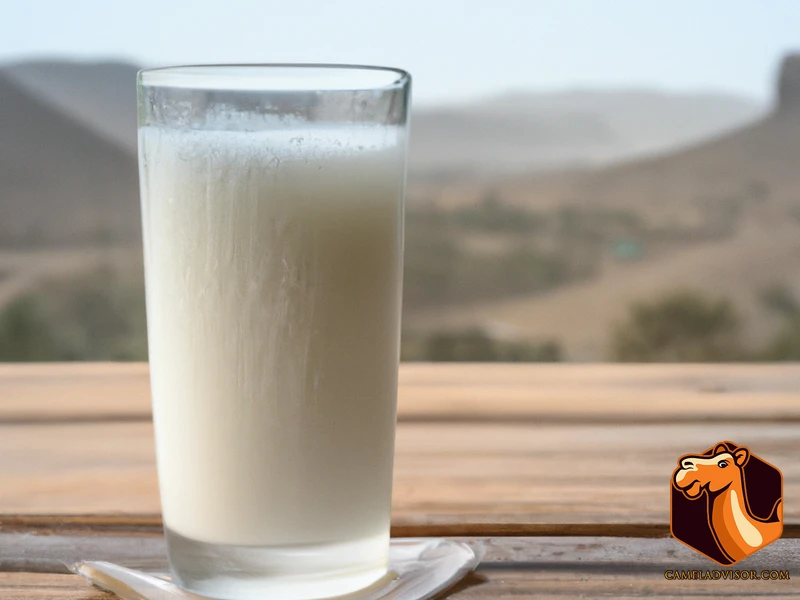Have you ever heard of camel milk? Many people are not aware of this lesser-known milk variety, but it has been consumed for centuries in some parts of the world like the Middle East and North Africa. Recently, camel milk has been gaining popularity due to its alleged health benefits and unique nutritional content. In this article, we will take a closer look at the nutritional value of camel milk, exploring its vitamin and mineral content as well as other beneficial nutrients. We will also delve into the potential health benefits of consuming camel milk and ways to incorporate it into your diet. But before we get into the details, let’s first understand what makes camel milk so intriguing.
Contents
- Nutritional Overview of Camel Milk
- The Health Benefits of Camel Milk
- How to Incorporate Camel Milk Into Your Diet
- Potential Risks and Drawbacks of Camel Milk Consumption
- Conclusion
-
Frequently Asked Questions
- What is camel milk?
- What are the nutritional advantages of camel milk compared to cow milk?
- What vitamins can be found in camel milk?
- What minerals can be found in camel milk?
- Can camel milk help with managing diabetes?
- What other health benefits does camel milk have?
- Is camel milk safe for lactose intolerant individuals?
- Can camel milk cause allergies?
- What is the recommended daily intake of camel milk?
- Where can I buy camel milk?
- References
Nutritional Overview of Camel Milk

Camel milk has been consumed for centuries and is a staple in many cultures. It is known for its unique taste and potential health benefits. Camel milk is a rich source of essential vitamins and minerals that are vital for maintaining good health. In fact, it contains higher concentrations of certain nutrients compared to other types of milk. In this section, we will delve into the nutritional value of camel milk, including its vitamins, minerals, and other key nutrients. Understanding these nutritional facts is essential for discovering the potential health benefits that camel milk can offer.
Vitamins in Camel Milk
Camel milk is a rich source of essential vitamins that are crucial for maintaining good health. It contains high levels of vitamins A, B1, B2, B12, and C, all of which play important roles in various bodily processes. Here is a breakdown of the vitamins found in camel milk:
| Vitamin | Function | Benefits |
|---|---|---|
| Vitamin A | Helps maintain healthy vision, skin, and immune function | Supports strong bones, teeth, and neurological function |
| Vitamin B1 (Thiamin) | Aids the metabolism of carbohydrates to produce energy and supports nerve function | Helps prevent complications related to diabetes, including nerve damage and heart disease |
| Vitamin B2 (Riboflavin) | Helps the body produce energy, supports healthy eyes, skin, and nerve function | May reduce the frequency and intensity of migraines, improve anemia symptoms, and protect against certain types of cancer |
| Vitamin B12 | Important for maintaining healthy blood cells and nerve function | Helps prevent anemia and birth defects, improve bone health, and enhance brain function |
| Vitamin C | Powerful antioxidant that supports skin, bone, and immune health | May reduce the risk of chronic diseases, such as heart disease, stroke, and certain cancers |
In addition to the vitamins listed above, camel milk also contains small amounts of other vitamins, such as vitamin D, E, and K. These vitamins also play important roles in various bodily processes including bone health, wound healing, and blood clotting.
It’s worth noting that the vitamin content of camel milk may vary depending on factors such as the animal’s diet, the season, and the region in which it was produced. However, overall, camel milk is a good source of essential vitamins that can contribute to overall health and well-being.
If you want to learn more about the health benefits of camel milk, check out our article on 5 Health Benefits of Camel Milk.
Minerals in Camel Milk
Camel milk is a rich source of essential minerals necessary for various bodily functions. These minerals include calcium, potassium, magnesium, sodium, iron, and copper.
Calcium is crucial for maintaining healthy bones and teeth, as well as for muscle function and nerve transmission. A cup of camel milk provides about 30% of the daily recommended intake of calcium, making it a valuable source of this mineral.
Potassium is essential for regulating fluid balance, blood pressure, and heart function. Camel milk contains 50% more potassium than cow’s milk, providing an excellent option for those looking to increase their potassium intake.
Magnesium is involved in over 600 biochemical reactions in the body, including energy production, muscle and nerve function, and protein synthesis. Camel milk is an excellent source of this vital mineral, providing almost 20% of the daily recommended intake in a single cup.
Sodium is essential for maintaining fluid balance in the body and for transmitting nerve impulses. While it is often recommended to limit sodium intake, camel milk provides a moderate amount, with one cup containing 6% of the daily recommended intake.
Iron is critical for the formation of red blood cells and for oxygen transport in the body. Camel milk is a rich source of iron, with one cup containing almost 10% of the daily recommended intake.
Copper is important for the production of red blood cells, connective tissues, and nervous system function. Camel milk contains 15% of the daily recommended intake of copper in one cup, making it a valuable source of this essential mineral.
Incorporating camel milk into your diet can provide many valuable health benefits, including improved digestion, enhanced immunity, and a reduced risk of disease. The minerals found in camel milk, such as calcium, potassium, magnesium, sodium, iron, and copper, can play crucial roles in maintaining optimal health. Check out the benefits of camel milk for calcium health to learn more about the importance of calcium in our daily diet.
Other Nutrients Found in Camel Milk
Camel milk is not only rich in vitamins and minerals but also contains other important nutrients that can enhance overall health and wellbeing. Some of the key nutrients found in camel milk include:
| Protein | Camel milk contains about 3-5% protein, which is higher compared to cow milk. This makes it an excellent source of protein for individuals who follow a plant-based diet or those who are lactose intolerant. |
| Fats | Camel milk contains a moderate amount of fat, with most of it being unsaturated fats that can help lower the risk of heart disease. |
| Carbohydrates | Camel milk contains a lower amount of lactose than cow milk, which makes it easier to digest for individuals who are lactose intolerant. |
| Vitamin C | Camel milk is an excellent source of vitamin C which can help protect against chronic diseases and promote skin health. In fact, it has been suggested that camel milk may contain even higher levels of vitamin C compared to cow milk. |
| Iron | Camel milk contains a moderate amount of iron which is important for the production of red blood cells and overall immune function. |
| Immunoglobulins | Camel milk contains high levels of immunoglobulins, which are antibodies that help fight off infections and diseases. These immunoglobulins have been shown to be effective against a range of bacteria and viruses, making camel milk a potentially valuable tool for supporting immune health. |
The presence of these and other nutrients in camel milk makes it a nutritious and healthy alternative to cow milk. Its benefits for digestion, immunity, diabetes, heart health, and skin health are just some of the reasons why more and more people are adding it to their diets. For more information on the health benefits of camel milk, check out the Camel Milk: Fighting Diseases Since Ancient Times article.
The Health Benefits of Camel Milk
For centuries, camel milk has been an important source of nutrition for people living in arid and semi-arid regions of the world. Recent studies have shown that camel milk is not only a tasty and versatile food, but it may also offer a range of health benefits. From improved digestion and enhanced immunity to managing diabetes and promoting heart health, camel milk has become a popular choice for those looking to improve their overall wellbeing. Let’s take a closer look at some of the ways camel milk can benefit your health. If you want to learn more about the use of camel milk for gut health, you can read our previous article here.
Camel Milk for Improved Digestion
Improving digestion is one of the many benefits that camel milk can offer. The unique composition of proteins and other nutrients in camel milk makes it easier for the body to digest compared to cow milk.
Camel milk is a rich source of proline, an amino acid that helps in the digestion of food. Proline works by breaking down protein molecules into smaller components, which makes it easier for the body to absorb and utilize them. This is particularly beneficial for people who struggle with digestive issues like bloating, gas, or constipation.
Additionally, camel milk contains lactoferrin, a protein that has been shown to have antimicrobial properties. Lactoferrin helps to keep harmful bacteria at bay while promoting a healthy balance of gut bacteria. This can help alleviate symptoms of gut inflammation and improve overall digestive health.
For those with lactose intolerance, camel milk can also be a great alternative to cow milk. Camel milk contains lower levels of lactose and is therefore easier for people with lactose intolerance to digest. This can be particularly important for individuals with digestive disorders, as undigested lactose can lead to uncomfortable symptoms.
Drinking camel milk can help improve digestion and alleviate symptoms of digestive disorders. Incorporating camel milk into your diet can be an easy way to boost your digestive health and overall well-being.
To learn more about the benefits of camel milk compared to cow milk, read our article on Camel Milk vs Cow Milk Health.
Camel Milk for Enhanced Immunity
Camel milk has been shown to enhance the immune system due to its high concentration of immunoglobulins and other immune-boosting compounds. Immunoglobulins are proteins that help to fight off bacteria and viruses in the body. Studies have shown that camel milk contains immunoglobulins specific to certain pathogens, such as Staphylococcus aureus and E. coli.
In addition to immunoglobulins, camel milk also contains lactoferrin, a protein that has been shown to have antimicrobial, antiviral, and anti-inflammatory effects. Lactoferrin has also been found to enhance the activity of natural killer cells, which are important components of the immune system.
Another immune-boosting compound found in camel milk is alpha-lactalbumin, which has been shown to enhance the proliferation of immune cells in the body. Alpha-lactalbumin has also been found to have anti-tumor effects.
Camel milk contains high levels of zinc, an essential mineral that has been shown to enhance immune function by promoting the activity of immune cells and reducing inflammation.
The immune-boosting properties of camel milk make it a promising food for individuals looking to support their immune system. It may be particularly beneficial for those with autoimmune diseases, allergies, or frequent infections.
Internal link: To learn more about the digestive benefits of camel milk, check out our article on Camel Milk for Improved Digestion.
Camel Milk for Managing Diabetes
Diabetes is a chronic condition that affects millions of people worldwide, and managing blood sugar levels is crucial for preventing complications. Camel milk has been shown to have a positive impact on blood sugar levels, making it a great addition to the diet of those with diabetes.
One study found that consuming camel milk for eight weeks resulted in a significant reduction in fasting blood glucose levels among participants with type 2 diabetes. Another study reported that camel milk consumption resulted in lower insulin resistance and improved insulin sensitivity in people with both type 1 and type 2 diabetes.
One reason for this effect could be the presence of insulin-like proteins in camel milk, which can mimic the action of insulin and help regulate blood sugar. Additionally, camel milk is lower in lactose than cow’s milk, making it a good choice for those who experience lactose intolerance symptoms.
When incorporating camel milk into a diabetes management plan, it’s important to note that it should not be used as a replacement for insulin or medication prescribed by a healthcare professional. However, adding camel milk to a balanced diet could be a useful addition for those looking to optimize their blood sugar control.
Camel milk could be a beneficial component of a diabetes management plan due to its positive impact on blood sugar regulation. If you know someone who has diabetes or prediabetes, share this article with them so they can learn about the potential benefits of camel milk for managing their condition.
Learn more about managing Diabetes with Camel Milk here.
Camel Milk for Promoting Heart Health
Camel milk has been found to have several benefits for heart health due to its low fat content and high levels of essential vitamins and minerals. Studies have shown that regular consumption of camel milk can help lower cholesterol levels and reduce the risk of heart disease.
In particular, camel milk is a rich source of potassium, which plays a critical role in regulating blood pressure and preventing hypertension. Additionally, camel milk contains magnesium, which is essential for maintaining a healthy heart rhythm.
Below is a table outlining the significant nutrients in camel milk that contribute to its heart-healthy properties:
| Nutrient | Amount per 100ml |
|---|---|
| Calories | 50 |
| Protein | 3g |
| Fat | 2g |
| Carbohydrates | 5g |
| Calcium | 120mg |
| Potassium | 190mg |
| Magnesium | 20mg |
| Vitamin C | 3mg |
| Vitamin B1 (Thiamin) | 0.03mg |
| Vitamin B2 (Riboflavin) | 0.14mg |
| Vitamin B3 (Niacin) | 0.1mg |
| Vitamin B5 (Pantothenic acid) | 0.3mg |
| Vitamin B6 | 0.05mg |
| Vitamin B9 (Folate) | 5mcg |
| Iron | 0.2mg |
It’s important to note, however, that camel milk should not be relied upon as a sole remedy for heart disease or other serious medical conditions. Individuals should always consult with a healthcare professional before making significant changes to their diet or exercise regimens.
Fun fact: some studies have even suggested that consuming camel milk regularly can lead to improved skin reactions to UVB exposure. To learn more about the benefits of camel milk for skin health, check out our article on The Benefits of Camel Milk for Skin Health. For information on how camel milk benefits the immune system, head over to our article on Camel Milk and Immune Health.
Camel Milk for Healthy Skin and Hair
Camel milk is not only known for its superior nutritional value but also for its skin and hair boosting properties. It is rich in vitamins and minerals that promote healthy hair and skin.
Vitamins
Camel milk contains a high amount of vitamins such as vitamin C, vitamin E, and vitamin A. Vitamin C is essential for the production of collagen, which gives skin its elasticity and helps reduce the appearance of wrinkles. Vitamin E helps protect the skin from damage caused by free radicals, and vitamin A promotes the growth of healthy skin cells.
Minerals
Camel milk is also rich in minerals such as iron, zinc, and magnesium, all of which are important for healthy skin and hair. Iron plays a crucial role in the production of red blood cells, which carry oxygen to the skin and hair follicles, promoting healthy growth. Zinc helps to regulate the production of oil in the skin, preventing clogged pores and acne. Magnesium is important for healthy hair, promoting growth and preventing hair loss.
Proteins and Fats
Camel milk is also a good source of protein and healthy fats. Protein is essential for building and repairing skin and hair tissues, while healthy fats keep the skin and hair hydrated and moisturized. The fats in camel milk are also rich in omega-3 and omega-6 fatty acids, which have anti-inflammatory properties and can prevent skin conditions such as eczema and psoriasis.
How to Use Camel Milk for Skin and Hair
Camel milk can be used in various ways to promote healthy skin and hair. It can be consumed as a standalone beverage or incorporated into your diet through cooking and baking. It can also be used topically as a moisturizer or added to shampoos and conditioners.
Here is a table summarizing the skin and hair benefits of camel milk:
| Benefit | How it Helps |
|---|---|
| Helps reduce wrinkles | High in vitamin C which is essential for collagen production |
| Protects skin from free radicals | High in vitamin E which is an antioxidant |
| Promotes healthy skin cells | High in vitamin A which promotes cell growth |
| Helps prevent clogged pores and acne | Rich in Zinc which regulates oil production |
| Promotes healthy hair growth | Rich in iron which carries oxygen to hair follicles and promotes growth |
| Prevents hair loss | Rich in magnesium which promotes healthy hair and prevents hair loss |
| Moisturizes skin and hair | Rich in protein and healthy fats which keep skin and hair hydrated and moisturized |
While camel milk has many benefits for skin and hair, it’s important to note that it may not be suitable for everyone. It’s always best to speak with a healthcare professional before incorporating it into your diet or skincare routine.
How to Incorporate Camel Milk Into Your Diet

If you’re interested in trying camel milk but unsure how to incorporate it into your diet, there are several options available to you. Camel milk can be enjoyed as a standalone beverage, used in cooking and baking, or as an ingredient in various camel milk products. In this section, we’ll explore the different ways you can add camel milk to your diet and reap its nutritional benefits. Whether you prefer a traditional glass of milk, experimenting with new recipes, or looking for innovative ways to add camel milk to your daily routine, we’ve got you covered.
Enjoying Camel Milk as a Standalone Beverage
When it comes to enjoying camel milk as a standalone beverage, there are several options available to you. Here are some ideas to consider:
- Drinking it cold: Perhaps the simplest way to enjoy camel milk is to drink it straight from the bottle after chilling it in the fridge.
- Adding flavorings: If you want to mix things up a bit, try adding some flavorings to your camel milk. Some people enjoy adding a bit of honey or vanilla extract for sweetness, while others prefer a pinch of sea salt or a sprinkle of cinnamon for some extra depth of flavor.
- Blending it into a smoothie: Camel milk makes a great base for smoothies, and its creamy texture goes well with a variety of other ingredients. Try blending it with some fresh fruit, spinach, and a scoop of protein powder for a nutrient-packed breakfast or snack.
- Using it in your coffee or tea: If you’re a fan of creamy coffee or tea, try swapping out your regular milk or creamer for camel milk instead. It will give your hot beverage a slightly different flavor and add some extra nutrition to your morning routine.
- Adding it to cereal or oatmeal: For a hearty breakfast, pour some camel milk over your favorite cereal or oatmeal. The milk’s natural sweetness pairs well with the mild flavors of these breakfast staples.
No matter how you choose to enjoy camel milk as a standalone beverage, it’s important to keep in mind that it may have a slightly different taste and texture than the cow’s milk you’re used to. Give it a chance to win you over, and you may be pleasantly surprised by its flavor and nutritional benefits.
Using Camel Milk in Cooking and Baking
Camel milk is a versatile ingredient that can be used in a wide variety of dishes, from savory to sweet. Its creamy consistency and unique flavor make it an excellent substitute for cow’s milk. Below are a few ways to incorporate camel milk into your cooking and baking:
As a substitute for cow’s milk: Camel milk can be used as a substitute for cow’s milk in almost any recipe. It can be used in baked goods like cakes, cookies, and muffins, as well as in sauces, soups, and stews. When using camel milk in place of cow’s milk, keep in mind that it has a slightly saltier taste, so you may need to adjust the recipe accordingly.
In smoothies: Adding camel milk to your smoothies is a great way to boost their nutritional value. It adds a creamy texture and a slightly sweet taste that complements the fruits and vegetables in the smoothie.
In coffee and tea: Camel milk can be used as a creamer in coffee and tea. It adds a unique flavor and a creamy consistency, making your beverage more enjoyable.
In traditional dishes: In many cultures, camel milk is a staple ingredient in traditional dishes. For example, in the Middle East, it is used to make a thick, creamy yogurt called Laban. In India, it is used to make a sweet, milky dessert called Shrikhand. Incorporating camel milk into traditional dishes is a great way to experiment with new flavors and add nutritional value.
Below is a table that summarizes some ways to incorporate camel milk into your cooking and baking:
| Usage | Examples |
| Substitute for cow’s milk | Use in baked goods, sauces, soups, and stews |
| In smoothies | Add to fruit and vegetable smoothies for added creaminess and nutrition |
| In coffee and tea | Use as a creamer for a unique flavor and creamy consistency |
| In traditional dishes from different cultures | Use in Middle Eastern Laban or Indian Shrikhand to experiment with new flavors |
Be sure to a enjoy camel milk in moderation, especially if you are using it in cooking and baking. While it offers a range of health benefits, it is still a dairy product and should be consumed in moderation to avoid any adverse effects.
Camel Milk Products You Can Try
If you’re interested in trying camel milk, there are several products you can explore. Here is a table showcasing some popular camel milk products and their nutritional information:
| Product | Nutritional Information per 100 ml |
|---|---|
| Plain Camel Milk | Calories: 50 Carbohydrates: 4g Protein: 3.6g Fat: 2.2g Calcium: 13% of Daily Value Iron: 4% of Daily Value |
| Camel Milk Powder | Calories: 510 Carbohydrates: 53g Protein: 35g Fat: 20g Calcium: 70% of Daily Value Iron: 59% of Daily Value |
| Camel Milk Cheese | Calories: 264 Carbohydrates: 5g Protein: 18g Fat: 20g Calcium: 60% of Daily Value Iron: 2% of Daily Value |
| Camel Milk Ice Cream | Calories: 200 Carbohydrates: 15g Protein: 2g Fat: 15g Calcium: 6% of Daily Value Iron: 2% of Daily Value |
Plain camel milk is a great place to start as it provides the full nutritional benefits of camel milk in its purest form. Camel milk powder is a popular option for those who want the convenience of a dry, shelf-stable milk product that can be easily reconstituted with water. Camel milk cheese is a unique and flavorful option for cheese-lovers, and camel milk ice cream is a sweet treat that provides a different taste experience than traditional dairy ice cream.
It’s worth noting that the nutritional information can vary depending on the brand and how the product is made, so be sure to read the labels carefully to ensure that you’re getting a product that aligns with your nutritional needs and preferences.
Potential Risks and Drawbacks of Camel Milk Consumption
Although camel milk provides numerous health benefits, it is not exempt from potential risks and drawbacks. It is important to be aware of these before incorporating camel milk into your diet. In this section, we will discuss some of the potential risks and drawbacks associated with camel milk consumption, including allergies and intolerances, high cholesterol content, contamination risks, and the difficulty of sourcing camel milk.
Allergies and Intolerances
People who are lactose intolerant may be able to tolerate camel milk since it contains lower levels of lactose than cow’s milk. However, it’s important to note that camel milk can still cause allergic reactions in some individuals.
According to research, casein is one of the main allergens in camel milk. Casein is a protein found in milk, and allergic reactions to it can range from mild symptoms such as hives and itching to severe symptoms like anaphylaxis.
Another potential allergen in camel milk is alpha-lactalbumin, which can cause allergic reactions in individuals who are also allergic to cow’s milk.
It’s recommended to consult a healthcare professional before consuming camel milk if you have a history of dairy allergies or intolerances. Additionally, individuals with autoimmune disorders should exercise caution since camel milk contains immunoglobulins that could potentially exacerbate certain conditions.
Below is a table that summarizes the potential allergies and intolerances associated with camel milk consumption:
| Potential Allergen/Intolerance | Possible Symptoms |
|---|---|
| Casein | Hives, itching, anaphylaxis |
| Alpha-lactalbumin | Allergic reaction in individuals also allergic to cow’s milk |
| Lactose | May be well tolerated by lactose intolerant individuals |
High Cholesterol Content
When it comes to the potential risks and drawbacks of consuming camel milk, it’s essential to mention its high cholesterol content. While camel milk is undoubtedly rich in essential vitamins, minerals, and healthy fats, it also contains a high amount of cholesterol compared to other milk types. Here’s a closer look at the cholesterol content of camel milk compared to other types of milk:
| Milk Type | Cholesterol Content (per 100ml) |
|---|---|
| Camel Milk | 10-20mg |
| Cow Milk | 2-5mg |
| Sheep Milk | 7-8mg |
| Goat Milk | 3-5mg |
As you can see from the table, camel milk contains approximately two to three times more cholesterol than cow, sheep, or goat milk. While this doesn’t necessarily make camel milk unhealthy or unsafe for consumption, it’s important to keep in mind if you’re watching your cholesterol intake.
Consuming too much cholesterol can lead to a buildup of plaque in your arteries, which can increase your risk of developing heart disease and other related conditions. While dietary cholesterol doesn’t affect everyone’s cholesterol levels in the same way, if you have high cholesterol or are at risk of heart disease, it’s essential to speak with your doctor before adding camel milk to your diet.
It’s worth noting that some studies have suggested that the cholesterol in camel milk may not contribute significantly to heart disease risk. For example, a 2015 study published in the Journal of Dairy Science found that while camel milk did contain more cholesterol than cow milk, it also contained more of the compound beta-sitosterol, which has cholesterol-lowering effects.
While the high cholesterol content of camel milk may be a concern for some, it’s essential to consider the other potential health benefits of this unique and nutritious milk source. As with any dietary change, it’s crucial to consult with your healthcare provider before adding camel milk to your diet.
Contamination Risks
Camel milk is produced and consumed in many parts of the world, and it is often considered to be a safe and healthy food. However, there is a risk of contamination with harmful substances, which can pose a serious health threat to consumers, particularly those with weakened immune systems.
The following table summarizes some of the contamination risks associated with camel milk:
| Contaminant | Possible Source | Health Risks |
|---|---|---|
| Bacteria (e.g. Salmonella, E. coli) | Poor hygiene during milking or processing | Gastrointestinal illness, fever, diarrhea, abdominal cramps, dehydration |
| Viral infections (e.g. hepatitis A) | Contaminated water or food fed to camels | Hepatitis, jaundice, fatigue, nausea, abdominal pain |
| Chemicals (e.g. pesticides, antibiotics) | Environmental pollution, improper use of drugs in camel husbandry | Toxic effects on the liver, kidneys, and other organs, increased risk of cancer |
| Parasites (e.g. Cryptosporidium, Giardia) | Contaminated water or soil, exposure to infected animals | Gastrointestinal illness, abdominal pain, nausea, vomiting, weight loss |
It is important to note that not all camel milk is contaminated, and the risk of illness can be reduced by following proper hygiene and safety practices during harvesting, transporting, and storing of camel milk. Consumers should be aware of the potential risks and choose high-quality, properly labeled products from trusted sources. If you have a weakened immune system or other health conditions, you should consult with your healthcare provider before consuming camel milk.
The Difficulty of Sourcing Camel Milk
One potential challenge when it comes to incorporating camel milk into your diet is the difficulty in sourcing it. This is because the majority of the world’s camel population is found in Middle Eastern countries, and camel milk is not as widely available as cow’s milk or other dairy alternatives.
The demand for camel milk is growing due to its numerous health benefits, making it even harder to come by in some areas. This limited supply can also drive up the cost of camel milk products, so for some consumers, it may not be a financially feasible option.
Another factor that makes it difficult to source camel milk is the strict regulations surrounding its import and export. Some countries require extensive testing and certification processes to ensure the safety and quality of camel milk products, which can add to the overall cost and make it harder for companies to distribute them on a wide scale.
Despite these challenges, there are ways to obtain camel milk for those interested in trying it out. Some health food stores, specialty markets, and online retailers may carry camel milk and related products such as cheese or yogurt. Additionally, some farmers or small-scale producers may sell camel milk directly to customers in certain regions.
While sourcing camel milk may be difficult at times, it’s important to weigh the potential benefits against these challenges and determine if it’s the right dairy alternative for your needs.
Conclusion
In conclusion, it is clear that camel milk is a highly nutritious beverage that is packed with vitamins, minerals, and other important nutrients. Its unique composition makes it an excellent option for those who are looking for a healthy alternative to cow’s milk.
The vitamins found in camel milk, including vitamins B1, B2, and C, play important roles in a wide range of bodily functions. They are essential for maintaining healthy skin, boosting the immune system, and promoting overall well-being.
Likewise, the minerals in camel milk, such as potassium, sodium, and magnesium, are crucial for maintaining healthy bones, regulating blood pressure, and supporting muscle function. These minerals, along with the other nutrients found in camel milk, make it a great choice for athletes, as well as those who are recovering from illness or injury.
Overall, the health benefits of camel milk are numerous and wide-ranging, making it a valuable addition to any diet. Whether you are looking to improve your digestion, boost your immunity, manage your diabetes, or promote heart health, camel milk can help.
However, it is important to be aware of the potential risks and drawbacks of camel milk consumption, including the risk of allergies and intolerances, the high cholesterol content, and the potential for contamination. It may also be difficult to source camel milk in some areas.
In conclusion, if you are looking for a nutritious and healthy beverage that offers numerous health benefits, camel milk is definitely worth considering. Just be sure to weigh the potential risks and drawbacks before making it a regular part of your diet.
Frequently Asked Questions
What is camel milk?
Camel milk is a type of milk that is obtained from camels. It is a staple food and a vital source of nutrition for people living in arid and desert regions.
What are the nutritional advantages of camel milk compared to cow milk?
Camel milk is generally higher in vitamin C and iron and lower in fat than cow milk. It also contains a unique type of protein that may be easier to digest.
What vitamins can be found in camel milk?
Camel milk is a rich source of several vitamins, including vitamin C, vitamin B1, vitamin B2, and vitamin A.
What minerals can be found in camel milk?
Camel milk is a good source of minerals such as potassium, magnesium, calcium, zinc, and phosphorus.
Can camel milk help with managing diabetes?
Yes, camel milk may help manage diabetes by improving insulin sensitivity and reducing blood sugar levels.
What other health benefits does camel milk have?
Camel milk is believed to have a wide range of health benefits, from boosting the immune system to improving heart health, promoting healthy skin and hair, and aiding digestion.
Is camel milk safe for lactose intolerant individuals?
Camel milk may be a viable option for lactose intolerant individuals since it contains less lactose than cow milk.
Can camel milk cause allergies?
Yes, just like any other food, camel milk can cause allergies in some individuals. It is important to exercise caution if you have a history of food allergies.
What is the recommended daily intake of camel milk?
There is no standardized recommendation for the daily intake of camel milk. It is important to consult with a healthcare professional to determine an appropriate amount for your individual needs.
Where can I buy camel milk?
Camel milk can be difficult to find in some areas. It may be available at specialty grocery stores or online retailers. It is important to ensure that any source of camel milk is reputable and reliable.







